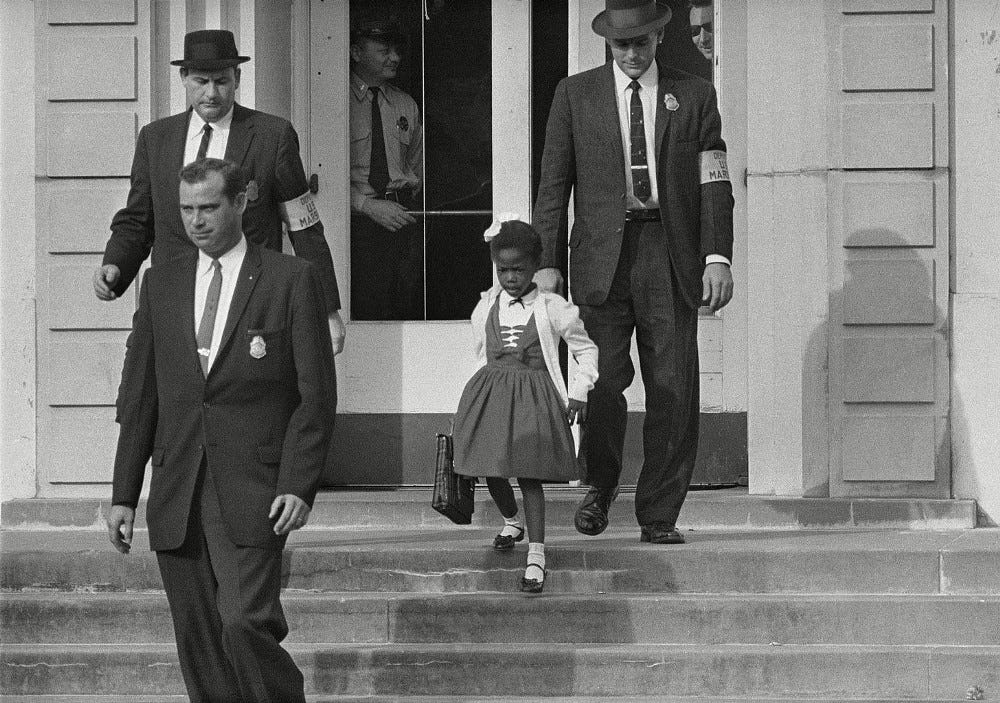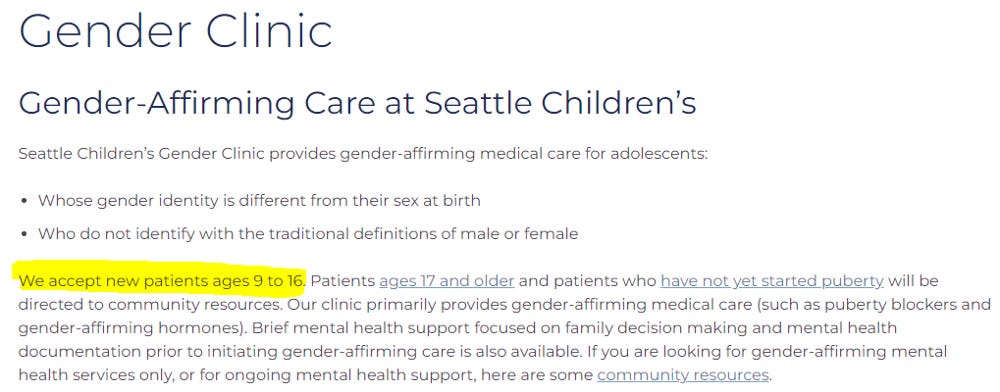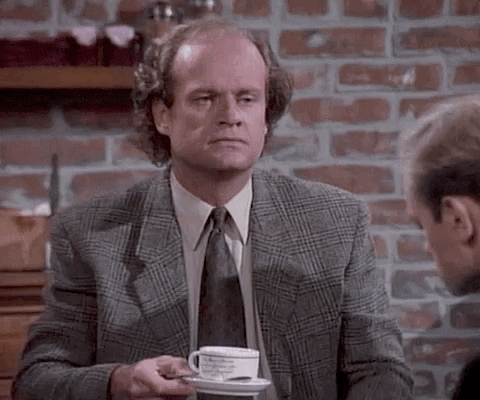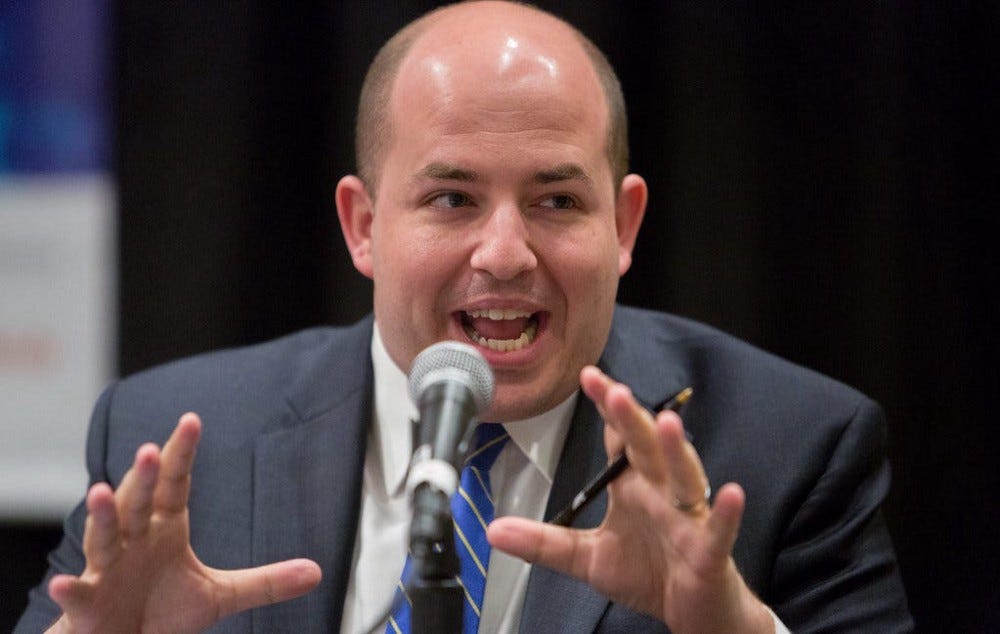
On November 14th, 1960, federal agents escorted six-year-old Ruby Bridges to and from an all-white school to kick off racial integration in public schools.
After many enraged white parents scrambled to fetch their children, they soon returned to protest the controversial event.
However, the remaining teachers and staff encouraged the new pupils to ignore the hateful messages from nearby “adults.”
With support from her parents and school admin, Bridges and her classmates had the guts to stay because they knew they were on the right side of history.
Four years later, in February 1964, four young lads from Liverpool set foot on American soil to spearhead the British invasion.
While countless American girls clamored to learn the rockstar’s favorite colors or foods, The Beatles had other things in mind, as did their contract.
One demand for their American tour was new equipment for Ringo, but the most popular clause was their refusal to play any venue where blacks “couldn’t sit where they like.”
In 1959, Max Robinson, an aspiring black reporter, applied for a whites-only job at a Portsmouth, Virginia, television station.
Management allowed him to audition alongside four white candidates, but although he got the gig, they only let the new anchor read the news off camera.
When Robinson demanded they show his face, the station manager reportedly replied with, ‘Portsmouth isn’t ready for color television.’
After a long road, Robinson eventually became the first black TV anchor in DC and the first to host ABC’s World News Tonight in 1978.
People in the 1960s made choices, and many opted to fight government-sponsored discrimination in education, entertainment, and media.
And to win the war against today’s modern “Crusaders,” individuals, organizations, and the media must also stand up to the mob.
That’s because, as history teaches us, following a moral compass instead of the herd pays off in the long run.
Just because something is law doesn’t make it right, as we saw in the Jim Crow South or Nazi Germany.
For good to win over evil, we must fight back.
But how?
Individual Dissent

It’s easy to speak your mind online or with friends, but it’s a different story in the workplace, especially in corporate America.
And when company leadership pushes unethical practices among its staff, sounding off can be difficult.
People need money, so sometimes, one must bite their tongue in favor of feeding their families.
But other times, small voices rise above the noise and inspire others.
Take ex-American Express employee Nick Williams for example.
According to a Fox article, the credit giant fired him after he told a black business owner that she was ineligible for a corporate card because she failed to provide the required documentation.
Sounds like a typical day on the phone with any international business.
Williams said that shortly after the incident, his leadership terminated him presumably because the conglomerate feared accusations of “systematic racism” that denies black business owners new opportunities.
American Express offered Williams a six-figure settlement to keep quiet, but Williams declined.
Yet there are two sides to every story, so I’ll offer AmEx’s public response:
Mr. Williams is spinning a false narrative of possible reasons — other than his own misconduct — for his involuntary termination from American Express. We are committed to complying with all laws and regulations, and do not tolerate misconduct. If we identify potential misconduct, we thoroughly investigate and will take appropriate actions, including and up to termination. -American Express spokesperson
But who do we believe?
When someone loses their job for genuine misbehavior, do they get a payout?
Not unless the employer had something to hide.
I was born in the morning, but not yesterday morning.
Step one: Don’t take the hush money, and speak up.
Stand out as an Organization
Organizations will naturally follow suit if enough people speak out for what’s right individually.
The following isn’t a comprehensive list, but here are a few examples of where authoritarianism has taken a particular hold.
Find a Pulse in Medical Leadership

Matt Walsh, the host of “The Matt Walsh Show” and creator of the 2022 documentary What is a Woman, recently said he regularly hears from anonymous doctors against the medical gender transitioning of children.
That’s great, as Walsh writes, but staying nameless doesn’t do anything for those children that are clueless about the long-term consequences of their parent’s decisions.
Of course, the gender topic is a vast spectrum, but most sane people draw the line when it comes to administering irreversible physical and mental damage to children.
Just look at what the Seattle Children’s Hospital does for kids.

What? Nine?

I don’t Photoshop this stuff, folks. Just click the links and see for yourself.
And I won’t go into detail here, but if you’d like to learn about penile inversion vaginoplasty, intestinal vaginoplasty, or scrotoplasty operations available to nine-year-old children, see here.
Yeah. That’s what I thought.
I’m writing this at 5:39 AM, and I have half a mind to pour half a whiskey.
Eventually, someone will have to answer for these kids that become suicidal, addicted to drugs, or simply ask their parents, why in God’s name did you have my genitals removed when I was nine?
Uhhhh, because you wanted to?
Unbelievable.
Step two: If you’re a surgeon or administrator, stand up against this nonsense.
Technically Speaking

While social media users await to see what happens with Elon Musk’s Twitter deal, the platform continues censoring users who don’t jive with the mainstream beliefs.
Most recently, Big Tech banned former kickboxer Andrew Tate for saying men should have “authority” over women in a relationship.
Not that I agree with his comments, but it’s essential to have conflicting opinions in the public square.
If, for example, you believe the Denver airport is a secret government facility or men should have authority over women, you should be able to offer your argument and subject it to criticism.
That’s how we analyze ideas, form arguments, and educate each other.
It’s what colleges used to do.
Speaking of the public square, there’s a new app in town.
PublicSq.com launched six months ago as a substitute for Yelp.
Their motto is “Connecting freedom-loving Americans with the local community and the businesses that share their values.”
CEO Michael Seifert set out to create a platform that allows business owners that have been banned or not promoted on authoritarian apps.
For far too long, tens of millions of liberty-minded Americans have needed a platform where they can engage with community, find reliable information, and connect with the businesses they can feel confident supporting — so we created one. -Michael Seifert, CEO, PublicSq.com
PublicSq is a technical response to companies like Yelp that treat their platform like the Soviet Union.
Since 2020 the Yelp secret police monitored businesses and removed users that “questioned the science.”
But one start-up won’t be enough to take on the giants.
Twitter alternatives such as Gettr, Gab, and Parler directly compete with the big leagues but don’t come close in terms of engagement.
Perhaps Trump-backed Truth Social has the most funding, but it’s so stigmatized that everyday people may not use it.
If people are afraid of being labeled as “extremists” by using alternative platforms that align with their views instead of going with the crowd, how can we expect to make a difference?
Step three: Start a technological revolution.
Speak Out of School

Who went the farthest off the deep end? Corporate America, Big Tech, or “educators?”
Tough to say, but with most American schools starting this week, the teachers are creeping back into the news.
And they aren’t wasting any time.
For example, the Minneapolis Public Schools say if they must lay off teachers, they will fire white staff before “people of color.”
The school district defended this new rule by saying,
To remedy the continuing effects of past discrimination, Minneapolis Public Schools and the Minneapolis Federation of Teachers (MFT) mutually agreed to contract language that aims to support the recruitment and retention of teachers from underrepresented groups as compared to the labor market and to the community served by the school district,” -Minneapolis Federation of Public Teachers
In a similar situation earlier this month in Utah, an elementary school teacher at William Penn Elementary posted a video about how her class was “built for non-white students.”
For the first time in my life, I’m going to be teaching at a majority-white school, and I’m kind of interested to see how students and parents react to my classroom, or if they even notice anything about it, because it’s built for non-white students. -Nameless “teacher”
This person has since removed the video, and the school gave a public statement saying they were committed to making sure every student feels safe and welcome and that “corrective action” would be taken if the school policies were breached.
So it’s up to educators and institutions to not allow this to happen by implementing a zero-tolerance policy for racist practices in schools.
That teacher should be terminated immediately and lose her license, just as we would expect if a white teacher built a classroom exclusively for white kids.
Such a curriculum might consist of learning about the history of cottage cheese and analyzing episodes of Frasier.

Most public and private colleges have incredibly liberal views built into their DNA by now, but things can change.
Yes, prospective students have many conservative colleges to choose from, between Brigham Young University, Olivet Nazarene, and Hillsdale College, to name a few.
But they have the same problem as Gab and Gettr in that they carry a stigma in the mainstream.
Everyday universities, community, and state colleges must stand up against divisive and racist policies and stop letting the students run the schools.
Kids must learn about the United States for all its faults and accomplishments and learn something useful.
Step four: Stop teaching children to treat each other based on skin color.
Old News

Not long ago, “fake news” was a conspiracy theory.
But now, the establishment media is circling the drain, as evidenced by big-name firings such as Brian Stelter at CNN.
The moves likely aren’t a result of a newfound ethical realization among management but because, over the past couple of years, network leaders finally realized that people generally don’t care for political propaganda.
Over the recent year, the conservative media company The Daily Wire exploded with new content and even produced feature films such as Shut In, Terror on the Prairie, and Run. Hide. Fight.
Other outlets such as Right Side Media or Newsmax also found a foothold, but they all have a conservative take.
Some people just want objective news.
Maybe that’s what the new management at CNN is going for. I guess we’ll see.
Step five: Real journalism must make a comeback
See the Forest from the Trees

In the years following racial integration in the US, young people celebrated Ruby Bridges, The Beatles, Max Robinson, and many others for standing up for freedom even when the majority opposed them.
And many whites were happy to see racial integration in schools, businesses, and media.
But many wouldn’t speak up for fear of losing their jobs or invite to the next block party.
Some think that only politicians and people of significant influence can change the world.
While we’re grateful for outspoken celebrities, it’s not enough.
Everyday people must speak up when necessary.
Doctors, judges, school boards, and business owners must also go against the grain to get this ship back on course.
Because in the next 5, 10, or 20 years, vaccine mandates, forced shutdowns, and child gender surgery, will go the way of Jim Crow and banned medical practices of yesterday.
Future people will consider mask mandates comparable to bloodletting, and gender-affirming surgery for children will reside in history books alongside pediatric lobotomies and shock therapy.
Our kids and grandkids will ask us where we stood in today’s madness, just like the kids of the 1980s and 1990s asked if their parents and grandparents turned black families away from their business.
What will we tell them?




